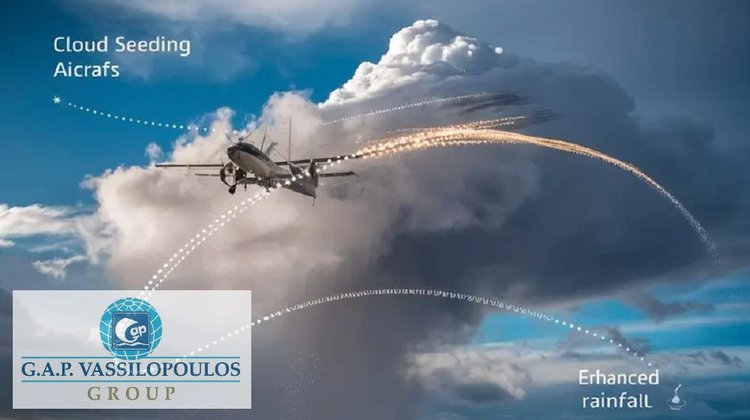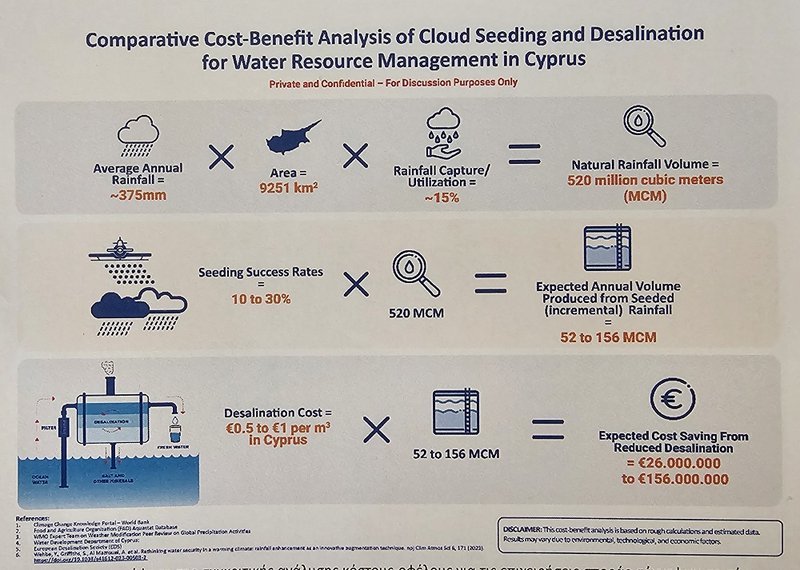G.A.P. Vassilopoulos' documented proposal for combatting the water shortage
Marios Adamou 08:46 - 22 April 2025

At a time when Cyprus is plagued by drought and dams are emptying, causing ripple effects in many sectors of the economy, and the Government is announcing a series of measures to address the situation, the Ministry of Agriculture has rejected, as scientifically unproven, a proposal put before it for cloud seeding.
This comes at a time when the European Commission's report on Cyprus, dated 14 June, 2023, states that by 2050, 40% of Cyprus will be desertified, as a result of climate change and drought.
According to the same report, in 2023 Cyprus lost over 2,100 hectares of productive land due to the increasing frequency of fires, which are linked to rising temperatures, reduced seasonal rainfall and the degradation of soil conditions and vegetation.
It is noted that cloud seeding is one of the solutions that is widely used to address water issues and aims to enhance/increase rainfall and increase/increase snowfall, while in many countries it also is used to suppress hail.
According to the UN's World Meteorological Organization (WMO), this technology has been applied for decades in over 60 countries, while cloud seeding programmes are currently running in 38 countries, including the USA, China, India, the United Arab Emirates, Greece, Germany, France and Saudi Arabia.
G.A.P. Vassilopoulos Group’s proposal
In light of the above, and wishing to contribute to the effort to address the water issue, the largest service provider in the sectors of transport and logistics, finance, human resource management, consumer, hospitality and environment, G.A.P. Vassilopoulos, in July 2024 submitted a comprehensive proposal - 50 pages long - to the Ministry of Agriculture for the exploitation of cloud seeding technology in Cyprus.
As InBusinessNews is in a position to know, the preparation and submission of the proposal was preceded by extensive research by the company, both on the cloud seeding method and on the companies active in the sector, what programmes are currently running and in which countries.
From their research, it was found that the most qualified and experienced company to undertake such a programme was a company from the USA, which holds a leading position in the field and has a fleet of 50 airplanes that are utilised in such programmes and which has patented many methodologies and has the longest history in the field, as well as working with the most countries that follow this specific technology.
In fact, executives of the US company - before preparing the study in collaboration with the Cypriot company - came into contact with the Meteorological Service and, for about a month, had direct communication with the Department and exchanged information and data on rainfall events in Cyprus over the last ten years, as well as on rainfall amounts from 1991 to 2024.
The US company, after thoroughly studying the data, concluded that Cyprus could run such a programme, and with positive results.
Following this development, the two companies prepared and submitted to the Ministry of Agriculture a proposal, which details a seven-month development plan for cloud seeding operations in Cyprus, as an initial demonstration for a long-term cloud seeding programme serving Cyprus and, potentially, an expanded operational programme serving the Eastern Mediterranean.
In fact, from the information collected by the Meteorological Service and analysed by the US company, it was found that through this practice - cloud seeding - natural rainfall in Cyprus can be increased by 10% to 30%.
Also, the proposal assumed that for the implementation of the programme, two privately owned aircraft of the US company with a twelve-member team - three crews (pilot and co-pilot), two meteorologists, two radar technicians and two programme managers - and a specialised C-band radar would come to Cyprus for seven months - from October 2024 to April 2025 (rainy months on the island).
The costs and benefits
Regarding the economic aspect, because there was no other way to compare the benefit of this proposal, a comparison was made with the cost of desalination, although the proposal never said or implied that cloud seeding would replace desalination.
Based on the proposal, the average cost of desalination per cubic meter is estimated at around 80 to 120 cents, while the cost per cubic meter with cloud seeding is estimated at 4 to 6 cents per cubic meter.
Therefore, the total cost of the proposal was estimated at around €9 million, while last year alone - together with the supplementary budget - the state paid a total of €160 million for the operation of the desalination plants.
Based on the above, preliminary cost-benefit analyses based on the climatology of Cyprus indicate desalination cost savings of between €26 million and €70 million, associated with a targeted 10% increase in annual natural precipitation through cloud seeding.
It is noted that this figure does not include the reduction in annual emissions of carbon dioxide and other environmentally harmful gases associated with the energy-intensive desalination process.
It is noted, however, that emissions from the cloud seeding process amount to less than 0.05% of the emissions from desalination plants.
Other important socio-economic and environmental benefits are also identified in a value chain linked to a more diversified water resources strategy that includes an operational artificial precipitation programme.

A seven month wait
It is worth noting that a few days after the submission of the proposal, a meeting was held at the Ministry of Agriculture between the president of the US company, the head of its scientific department, the competent minister, Maria Panayiotou, the Permanent Secretary of the ministry, Andreas Gregoriou, the minister's associates, the director of the Meteorology Department and a representative of the Presidential Office, during which a presentation was made and an initial discussion took place.
And yet, it took the Ministry seven full months to provide its response - a rejection based on vague references to "scientific uncertainty", at a time when dozens of governments worldwide have been utilising this technology for decades and while the proposal itself was accompanied by a bibliography consisting of 46 scientific and other sources.
In the meantime, however, and due to the Ministry's stance on the matter, the company sought and held a second meeting on the matter around mid-October, during which some questions the Ministry had regarding the scientific background of the proposal were answered.
As it became clear, however, during the meeting, the Ministry's questions were not resolved and it was decided to complete it, with the Ministry committing to return with additional questions on the proposal.
Ultimately, the Ministry of Agriculture returned two weeks later with only four questions, which were answered by the company on the same day, while the official response-position of the Ministry of Agriculture on the submitted proposal came on 3 January, 2025 - seven months after the proposal was submitted -, with the Ministry announcing that it would not proceed with this specific solution, because - as it found - it is not scientifically proven and cannot guarantee specific results, i.e. specific quantities of water.
It is noted that due to the importance of the issue, the company submitted the proposal to both the Ministry of Finance and the Ministry of Transport, while also holding a series of meetings and contacts with various bodies, such as professional organisations, farmers, livestock breeders, as well as with members of parliament, many of whom viewed the proposal positively.
Why rejecting the proposal is unfortunate and dangerous
As those familiar with the matter emphasise, this decision to reject the proposal is not only unfortunate, but also dangerous, as it disregards international practices, underestimates the expertise and documented recommendations of authoritative bodies, and deprives the country of a realistic, immediately applicable solution in the face of a growing crisis.
A crisis, which - as indicated - could develop into a complete disaster for certain sectors such as agriculture, livestock farming, exports (potatoes, citrus fruits, halloumi), as well as the tourism industry with its high demands on water consumption.
This comes at a time when Cyprus is struggling along with the countries in the region to upgrade and promote its tourism product, at a time when a very basic need that visitors have, the uninterrupted supply of water, is being called into question.
In light of the above, it is clear that Cyprus cannot wait any longer, with citizens demanding solutions and not bureaucratic evasions and policies of fear, as we have reached the "one and only" point in everything that has to do with the water problem.
It is becoming clear that our country has exceeded its limits, where hundreds of thousands of Cypriot citizens and millions of tourists are suffering without any substantive proposal and solution from the Ministry of Agriculture on the immediate horizon.
And it also becomes clear that it is time for the state to assume its responsibilities for water, and not to behave amid such a large and vitally important problem for the local economy as if... it were raining.
(Source: InBusinessNews)

